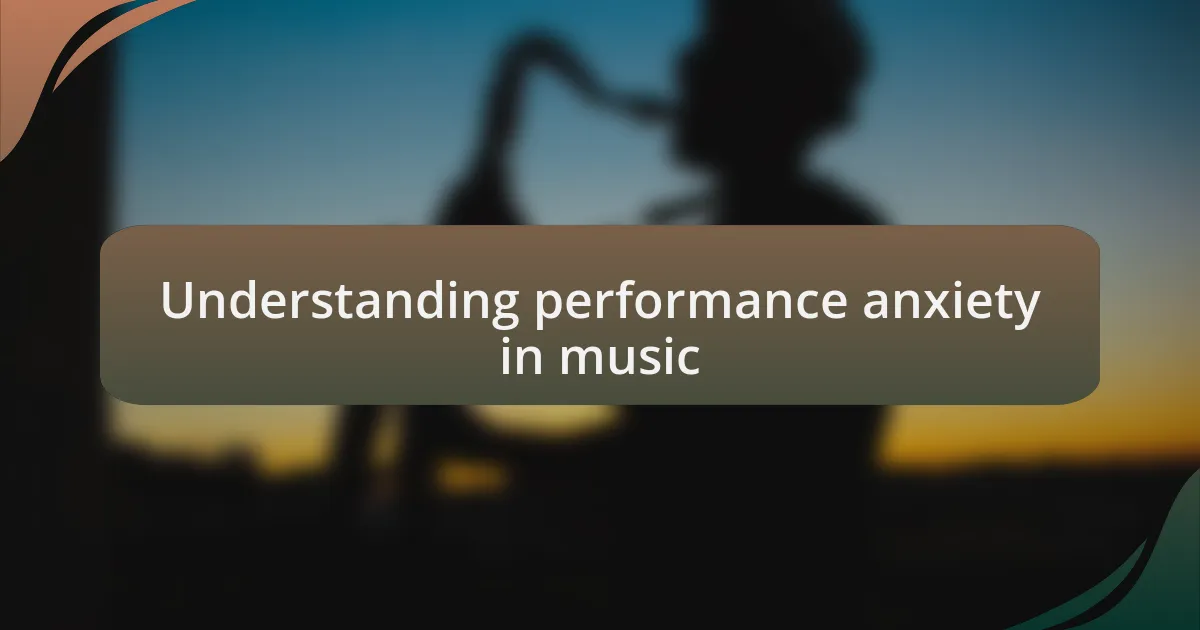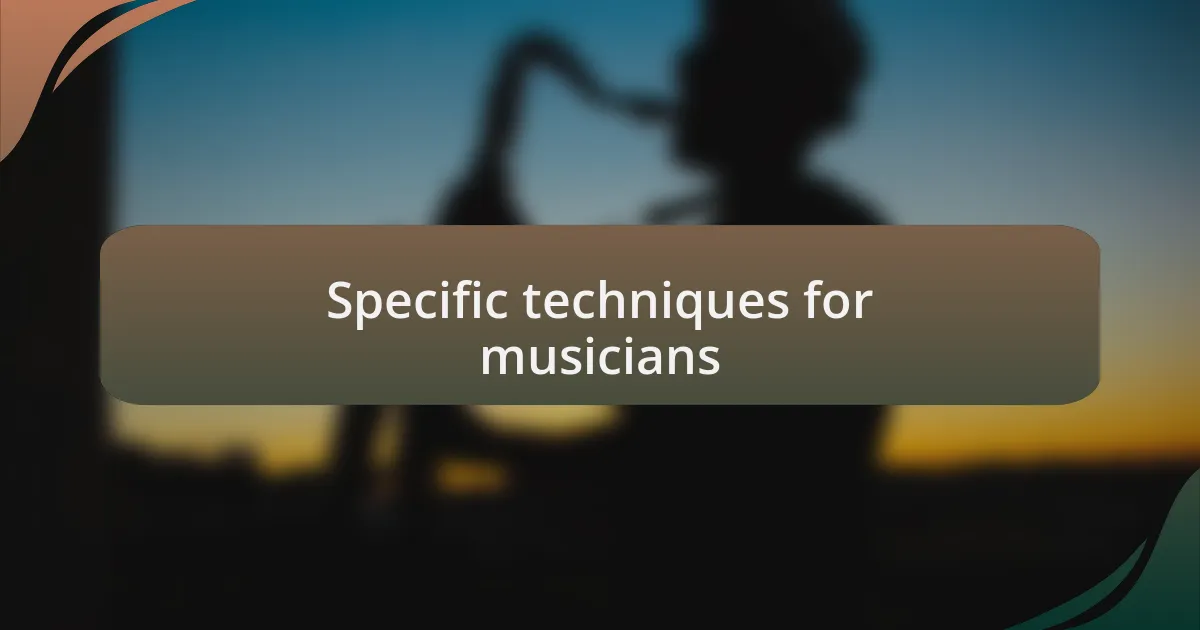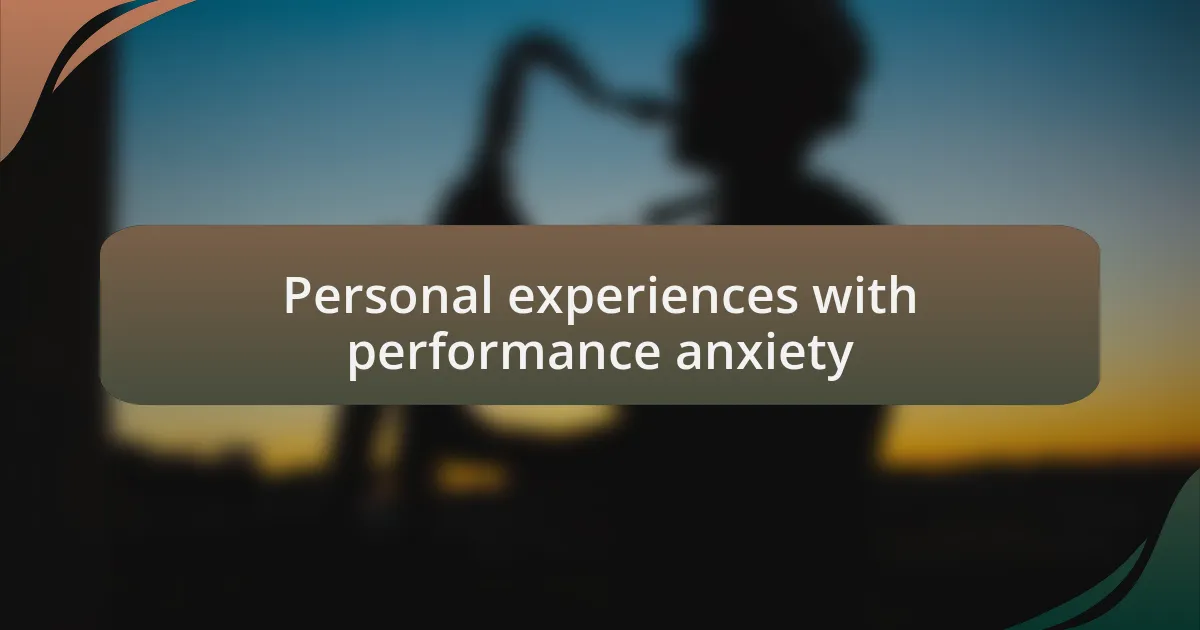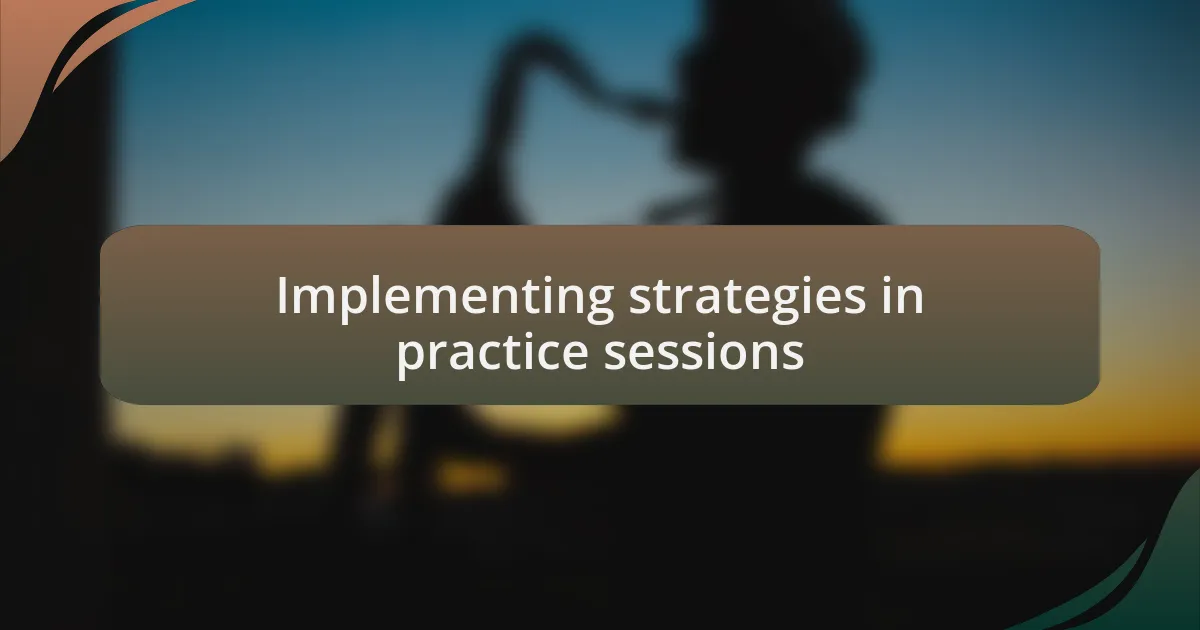Key takeaways:
- Performance anxiety is common among musicians and can stem from fear of judgment and past experiences.
- Techniques like deep breathing and visualization can significantly reduce anxiety levels before performances.
- Engaging in smaller performances can build confidence and desensitize one to performance pressure.
- Sharing experiences with fellow musicians can alleviate feelings of anxiety and create a sense of community.

Understanding performance anxiety in music
Performance anxiety in music is a common experience that many musicians face, regardless of their skill level. I remember the first time I performed live; my hands were shaking so much that I could barely hold my instrument. This feeling of dread often stems from the fear of judgment or not meeting one’s own expectations. Have you ever felt that knot in your stomach before stepping on stage?
It’s intriguing how performance anxiety can manifest physically and emotionally, creating a cycle that often seems hard to break. When the spotlight hits, I’ve felt my heart race and my palms sweat. This physiological response is your body’s way of reacting to stress; understanding this can help in finding ways to manage it. It’s crucial to recognize that these feelings are not just yours; they are shared by countless musicians, which can sometimes bring comfort in knowing you are not alone.
Moreover, some anxiety might even stem from past experiences. I recall a performance where I stumbled over a piece and felt utterly crushed. That moment haunted me for weeks, but it also became a driving force in my practice. So, how do we turn those anxious moments into learning experiences? Acknowledging the anxiety and reframing it as a response to a challenge can be empowering and change how we approach our performances.

Specific techniques for musicians
When it comes to overcoming performance anxiety, deep breathing exercises can be a game-changer. I recall using a technique where I would take slow, deliberate breaths before a performance, inhaling for a count of four and exhaling for six. It really helped center my thoughts and calm those racing nerves—try it before your next gig; you might find it works wonders.
Visualization is another powerful tool that I discovered through trial and error. I often close my eyes and picture myself on stage, exuding confidence and playing flawlessly. By vividly imagining success, I’ve noticed a significant drop in my anxiety levels on the actual performance day. Have you ever tried visualizing your performance? It can transform your mindset and create a clearer path to achieving your goals.
Finally, embracing small performances can help build your confidence over time. Instead of waiting for the big recital, I started playing for friends or even at local open mics. Each little experience not only improved my skills but also desensitized me to the pressure of performing. What if you took that same approach? By gradually exposing yourself to performance situations, you might find that the anxiety diminishes, allowing your true talent to shine through.

Personal experiences with performance anxiety
Before I started performing regularly, I struggled deeply with anxiety. I distinctly remember preparing for a solo at my high school concert; I was so overwhelmed that I could barely sleep the night before. That feeling of dread nagged at me constantly, making me question if I was even good enough to take the stage, prompting me to think, “What if I forget the notes?”
There was a moment during my college years that changed everything for me. I had an upcoming recital that had me on edge, but I decided to share my fears with a close friend who was also a musician. To my surprise, they confided that they felt the same way before every performance. This shared vulnerability struck a chord with me, reminding me that I wasn’t alone in this struggle. Sometimes, just acknowledging our anxiety can lessen its grip.
One particularly memorable performance stands out: I was set to play a duet with my mentor. As I stood behind the curtain, my heart raced, and I could hear my thoughts spiraling, “What if I mess up?” But when the lights came up and I locked eyes with my mentor, a wave of calm washed over me. I realized that, in that moment of sharing music, we were in it together—anxiety and all. Has that moment ever happened to you, where the connection to another made the performance feel less daunting? It’s a beautiful reminder that performance anxiety is something many of us face, yet we can find comfort in our shared experiences.

Implementing strategies in practice sessions
In my practice sessions, I began implementing specific strategies that not only helped me focus but also eased my anxiety. One technique that I found invaluable was visualization; before I even picked up my instrument, I would close my eyes and picture myself performing flawlessly. It allowed me to create a mental script of success, and let me tell you, that sense of accomplishment I felt in my mind made a real difference when it came time to play.
Gradually, I incorporated breath control exercises into my routine. These gentle, deep breaths became my anchor during those moments of rising tension. I vividly recall a practice session where I was fretting about an upcoming performance; by taking a few moments to just breathe, I could feel my heart rate drop, and my thoughts quieten. Have you ever noticed how something as simple as focusing on your breath can shift your mindset? For me, those moments of pause transformed my practice sessions from a chore into a space of exploration.
Additionally, I made it a point to record my practice sessions to gain a fresh perspective on my progress. Listening back, I often realized that the mistakes I stressed over in the moment were minimal—sometimes my worries were far worse than the reality. This habit not only built my confidence over time but reinforced that it’s okay to be imperfect. How about you—have you ever recorded your practice? It can be an eye-opening experience, one that reminds us that we all have room to grow.